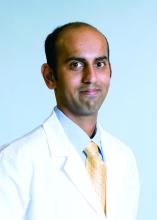Ms. Guo noted that a Swedish national survey among 4-year-olds found a mean SSB consumption of 187 g/d with a mean frequency of once daily. The most desired changes in food habits are a lower intake of soft drinks, sweets, crisps, cakes, and biscuits and an increase in the intake of fruits and vegetables. A similar Norwegian survey among 2-year-olds showed that SSBs were consumed by 36% of all children with a mean intake of 40 g/d.
The exact mechanism by which sugar affects the intestinal microbiota is not established. “However, what we do know is that an excessive intake of sugar can disrupt the balance of the gut microbiome,” Ms. Guo said. “And if the child has a high intake of foods with high in sugar, that also increases the chances that the child’s overall diet has a lower intake of other foods that contribute to a diverse microbiome such as fruits and vegetables.”
An ‘Elegant’ Study
In an accompanying editorial, gastroenterologist Ashwin N. Ananthakrishnan, MBBS, MPH, AGAF, of Mass General Brigham and the Mass General Research Institute, Boston, cautioned that accurately measuring food intake in very young children is difficult, and dietary questionnaires in this study did not address food additives and emulsifiers common in commercial baby food, which may play a role in the pathogenesis of IBD.
Another study limitation is that the dietary questionnaire used has not been qualitatively or quantitatively validated against other more conventional methods, said Dr. Ananthakrishnan, who was not involved in the research.
Nevertheless, he called the study “elegant” and expanding of the data on the importance of this period in IBD development. “Although in the present study there was no association between diet at 3 years and development of IBD (in contrast to the association observed for dietary intake at 1 year), other prospective cohorts of adult-onset IBD have demonstrated an inverse association between vegetable or fish intake and reduced risk for CD while sugar-sweetened beverages have been linked to a higher risk for IBD.”
As to the question of recommending early preventive diet for IBD, “thus far, data on the impact of diet very early in childhood, outside of breastfeeding, on the risk for IBD has been lacking,” Dr. Ananthakrishnan said in an interview. “This important study highlights that diet as early as 1 year can modify subsequent risk for IBD. This raises the intriguing possibility of whether early changes in diet could be used, particularly in those at higher risk, to reduce or even prevent future development of IBD. Of course, more works needs to be done to define modifiability of diet as a risk factor, but this is an important supportive data.”
In his editorial, Dr. Ananthakrishnan stated that despite the absence of gold-standard interventional data demonstrating a benefit of dietary interventions, “in my opinion, it may still be reasonable to suggest such interventions to motivate individuals who incorporate several of the dietary patterns associated with lower risk for IBD from this and other studies. This includes ensuring adequate dietary fiber, particularly from fruits and vegetables, intake of fish, minimizing sugar-sweetened beverages and preferring fresh over processed and ultra-processed foods and snacks.” According to the study authors, their novel findings support further research on the role of childhood diet in the prevention of IBD.
The All Babies in Southeast Sweden Study is supported by Barndiabetesfonden (Swedish Child Diabetes Foundation), the Swedish Council for Working Life and Social Research, the Swedish Research Council, the Medical Research Council of Southeast Sweden, the JDRF Wallenberg Foundation, ALF and LFoU grants from Region Östergötland and Linköping University, and the Joanna Cocozza Foundation.
The Norwegian Mother, Father and Child Cohort Study is supported by the Norwegian Ministry of Health and Care Services and the Ministry of Education and Research.
Ms. Guo received grants from the Swedish Society for Medical Research and the Henning and Johan Throne-Holst Foundation to conduct this study. Co-author Karl Mårild has received funding from the Swedish Society for Medical Research, the Swedish Research Council, and ALF, Sweden’s medical research and education co-ordinating body. The authors declared no competing interests. Dr. Ananthakrishnan is supported by the National Institutes of Health, the Leona M. and Harry B. Helmsley Charitable Trust, and the Chleck Family Foundation. He has served on the scientific advisory board for Geneoscopy.



